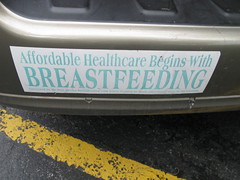- in Breastfeeding by Alexis Rodrigo
- |
- 1 comments
Baby Formula Risks
Risks of Using Baby Formula
When a woman uses baby formula, she is either only partially breastfeeding or not breastfeeding at all. Research shows that the lack or absence of breastfeeding increases risks to both the child and the mother. Some of the risks of using baby formula are irreversible, lasting well into adulthood. Every woman should be aware of these risks before she decides how she will feed and nurture her child.
Risks of Baby Formula to Children
Babies who are fed with baby formula have increased risk for:
* diarrhea and pneumonia
Babies fed with formula are sick more often from acute respiratory infections, pneumonia and diarrhea.
* obesity and diabetes
Children who have only had baby formula are more likely to become overweight and develop diabetes than those who had been breastfed.
[ad#ad-2]
* asthma
Formula-fed babies are 40-50% more likely to develop asthma and wheezing than those who had been breastfed for at least nine months.
* allergies
Studies show that atopy, eczema, food allergy and respiratory allergy were more common among children who received baby formula than those who had been breastfed.
* cancers
Those who were formula-fed are more likely to develop breast cancer, leukemia and cancers that are associated with weight gain and obesity.
* infection from contaminated formula
Baby formulas have been contaminated with anything from molds and iron particles to melamine and other toxic matter. The International Food Safety Authorities Network concludes, “it seems not to be possible, using current technology, to produce commercially sterile powders or completely eliminate the potential of contamination.”
* reduced intelligence
Formula-fed babies have lower IQs than breastfed children, and the longer a child is breastfed, the higher the difference. This has been observed up to adulthood.
Risks of Baby Formula to Women
Women who use baby formula have increased risk for:
* breast, ovarian and endometrial cancers
Women who use baby formula instead of breastfeeding are more likely to develop breast, ovarian and endometrial cancers than women who have breastfed. The longer a woman breastfeeds, the more she is protected.
* diabetes
The less a woman breastfeeds, the higher her chance of developing diabetes. On the other hand, every year of breastfeeding reduces a woman’s risk of diabetes by 15 percent.
* osteoporosis
Women who have never given birth and breastfed tend to have lower bone density and higher risk of fractures than women who have had many children and breastfed for a long time.
* rheumatoid arthritis
The less a woman breastfeeds, the higher her chance of developing rheumatoid arthiritis. In contrast, breastfeeding for more than 12 months reduces a woman’s risk.
* overweight
Every month of breastfeeding can reduce a woman’s weight by 0.44 kg. Those who use baby formula are less likely to lose the pregnancy weight.
* reduced natural child spacing
Women who use baby formula miss out on the natural contraceptive effect of exclusive breastfeeding for six months.
* increased stress and anxiety
In a study, women who use baby formula reported less positive moods, fewer positive events, more stress, more depression, and more anger than breastfeeding women.
There’s more to using baby formula than simply choosing a way of feeding your child. Baby formula brings health and other risks to both mother and child. Every woman should carefully consider these risks, keeping in mind their long-term, irreversible nature. Mother’s breastmilk and baby formula are worlds apart.
[!AdServe:Motherwear!]If you liked this post, submit your email address below to get new posts by email:


![Reblog this post [with Zemanta]](https://img.zemanta.com/reblog_e.png?x-id=fc46c5c1-134c-44d0-a4ee-e14791654f8d)